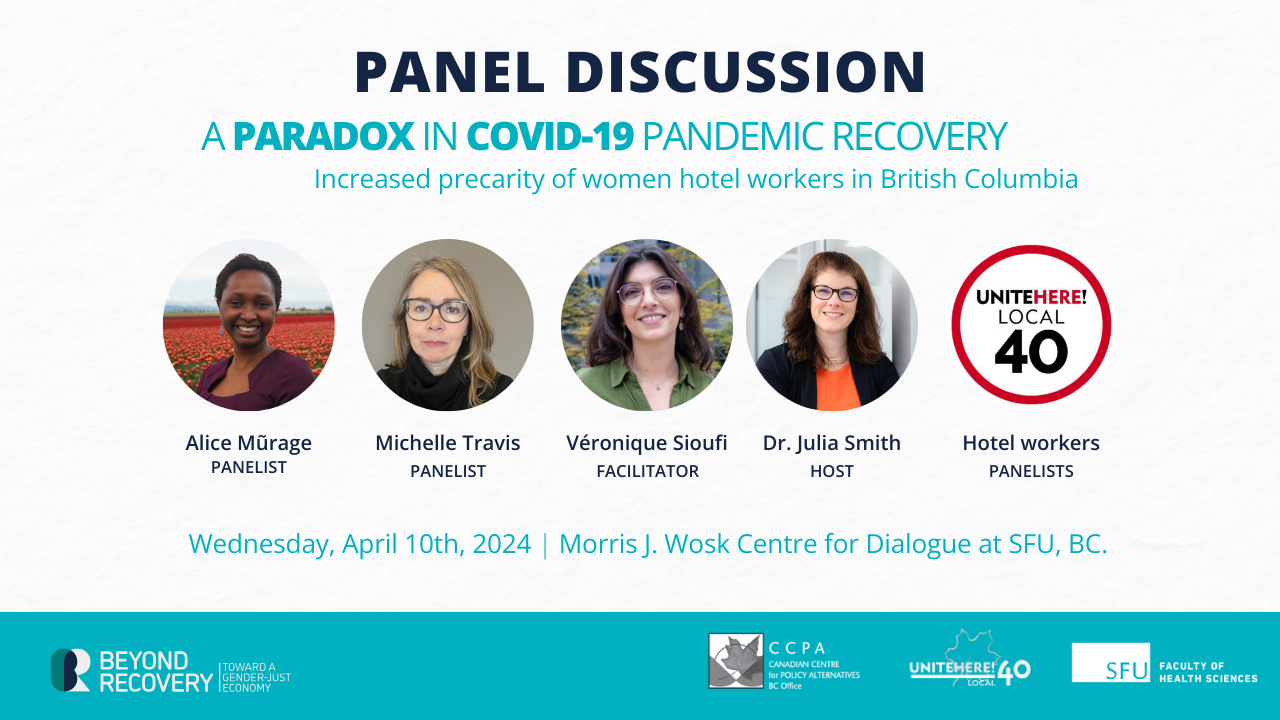We’re Moving towards a Healthier, More Equitable Society. Don’t Let Progress Stop

Heartbreaking stories have emerged from their regular invisibility during the pandemic—hungry children, isolated elders, violence and child abuse, often with poverty or trauma at the root. Injustices experienced by many people in Canada predated the pandemic, and it hurts to witness it.
Meanwhile, equitable societies are better for everyone in them. In January, an article in the Canadian Medical Association Journal called for immediate action on injustices through a “health in all policies” action plan. Suddenly, we’re seeing it unfold. We mustn’t forget this as the lure of austerity policies and economic recovery post-COVID-19 forces these injustices back under a cloak of “normalcy.”
Equity is that painful lens the virus is forcing us to look through en masse, and through it we see injustice: What is making people sick? Who is falling through the cracks and suffering health consequences as a result? Who is being marginalized by systems set up to fail them?
Equity is that painful lens the virus is forcing us to look through en masse.
We have been forced to pay attention to these (same old) questions during the pandemic because isolation is a privilege, we are in this together, and we have an ethical obligation not to further marginalize people through our pandemic action plans.
Many of us have been fighting for recognition of inequities—and poverty as an epidemic of its own—for decades, with minimal traction. We are told to avoid using terms like social determinants of health, because it “turns people off.” Truth is, people don’t like thinking about inequity because it makes people with privilege uncomfortable, and the solutions are complex.
But discomfort is alleviated through action. Suddenly, a virus emerges that rallies us. We now see:
- Financial aid, a small boost to inhumane welfare rates and discussion about universal basic income.
- Job protection for long-term care workers in B.C. and attention to horrific conditions linked to the privatization of elder care.
- A hard look at food security and the injustice of relying on charitable food banks.
- Help for people experiencing homelessness. (In March, a team including myself published evidence-based guidelines on this topic; we need more movement towards housing first.)
- Access to a safe drug supply.
- And more.
This is why we need a “health in all policies” approach. Acting upstream is better for everyone and saves money on health care by not trapping people in unhealthy conditions that we know lead to downstream disease—things like forcing families on social assistance to live below the poverty line and not giving them a (meagre) supplement for healthy food until after they are diagnosed with diabetes.
The landscape of people struggling during the pandemic is vast, and the mental health and intergenerational impacts of stress are less visible than the daily COVID-19 statistics. The logistics of getting (and affording) basic needs is overwhelming for single moms, elders, people with disabilities, mental illness and many others. Too many working Canadians live without a safety net and many groups are calling for guaranteed livable incomes.
Too many working Canadians live without a safety net.
Many people on the pandemic’s frontline are undervalued: people staying home with insufficient support, food producers, farmers, grocery staff, couriers, janitorial staff, daycare providers, support workers. Let’s cheer for them at 7 pm and fight for living wages for them too.
Evidence of the inequitable impacts of the virus is mounting. Impacts on those with less privilege are more visible in New York and globally where isolation may cause more death from deprivation and preventable disease than COVID-19 ever would. Canada also has income inequality, child poverty, gender inequity and Indigenous communities with limited health care capacity. The pandemic is exacerbating inequity here as well.
Considering the health impacts of all policies will enable us to confront looming questions: How will we act on the parallel epidemics of opioid addiction, mental illness and child abuse? Are elders in long-term care facilities suffering more from neglect and isolation than they would be from an earlier death? What about those grieving devastating tragedies alone? These are difficult questions to answer, not excuses for inaction.
Evidence of the inequitable impacts of the virus is mounting.
COVID-19 presents an opportunity for public health systems to act in ways they are good at. There is a protocol for pandemic management, so we act. The same doesn’t quite exist for inequities, but there is evidence and momentum.
A “health in all policies” approach has begun in the pandemic and can extend beyond it. We need more critical thinking and continual improvement through trial and error, both in social policy and in health care. Health care reforms must reorient towards equity, and where programs are insufficient or incomplete, we can roll out better solutions. We started with urgent policy responses and now is the time to get collaborative by engaging the public and equity-oriented organizations.
Inaction on inequities will compound harms of the pandemic. By protecting the most vulnerable during the pandemic, we are on a faster track to a more equal society. We can’t stop. Acts of altruism and generosity are keeping us going. Now is our time to make that happen in all policies so that we don’t leave anyone behind, through the COVID-19 era and beyond.
————————————————————
This article first appeared in The Tyee.
Topics: Health care, Poverty, inequality & welfare, Uncategorised


